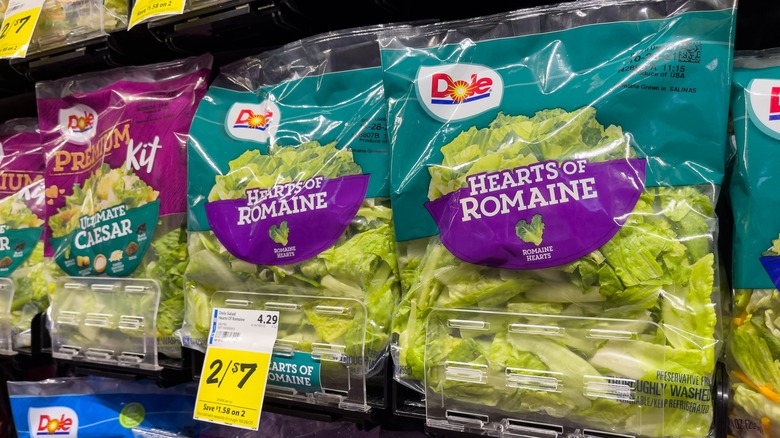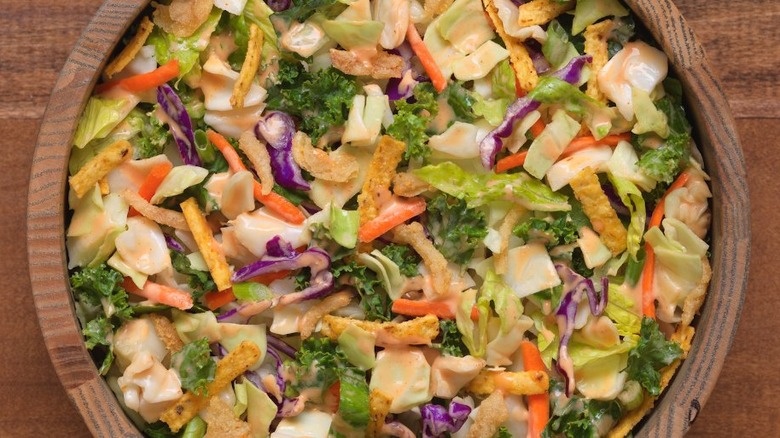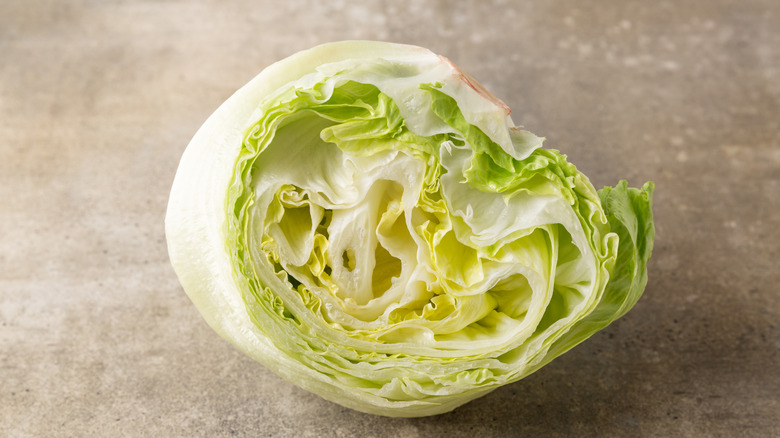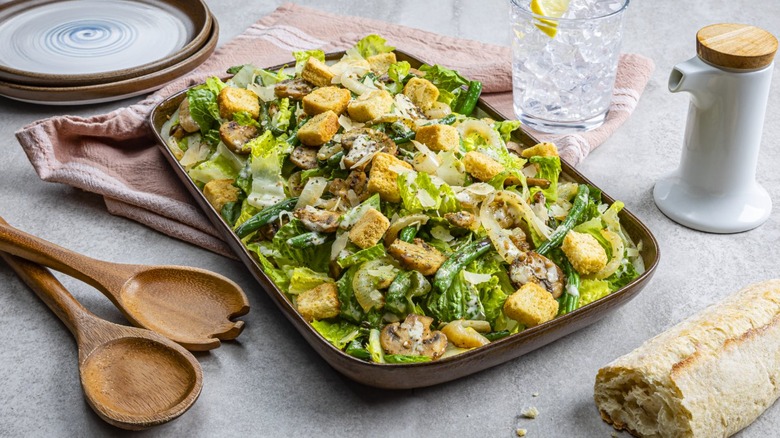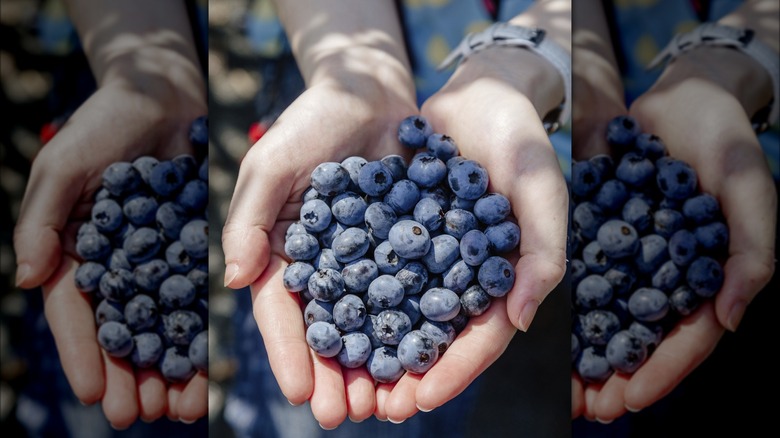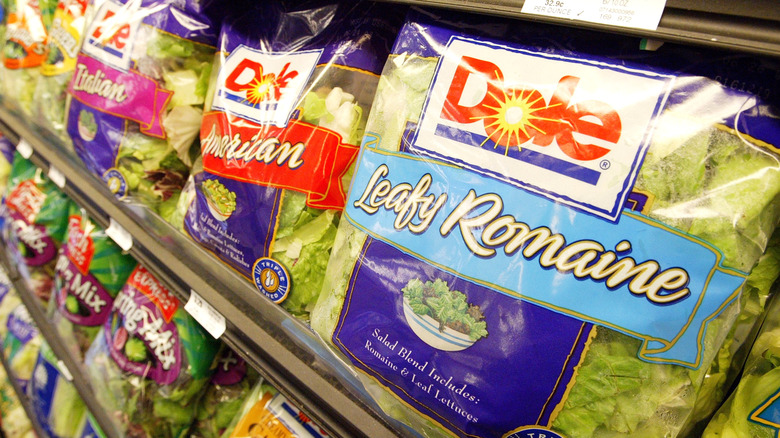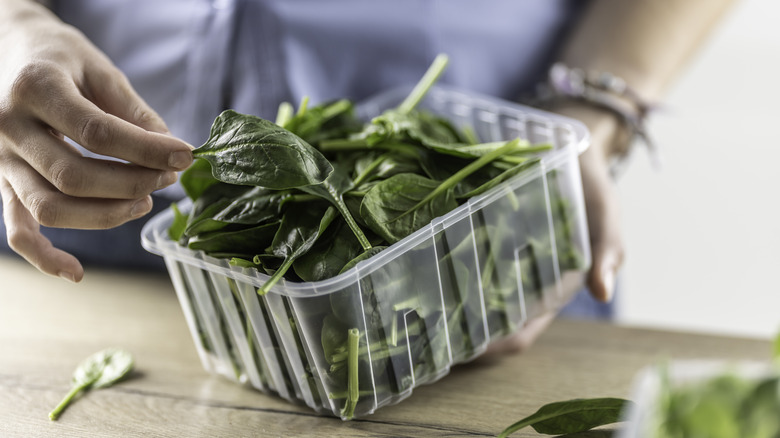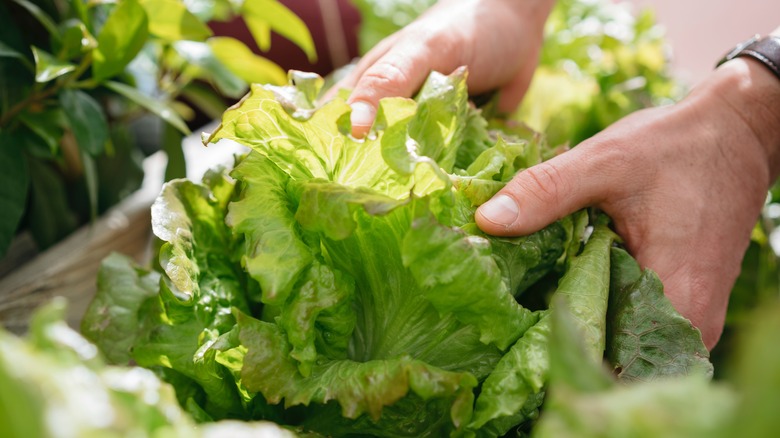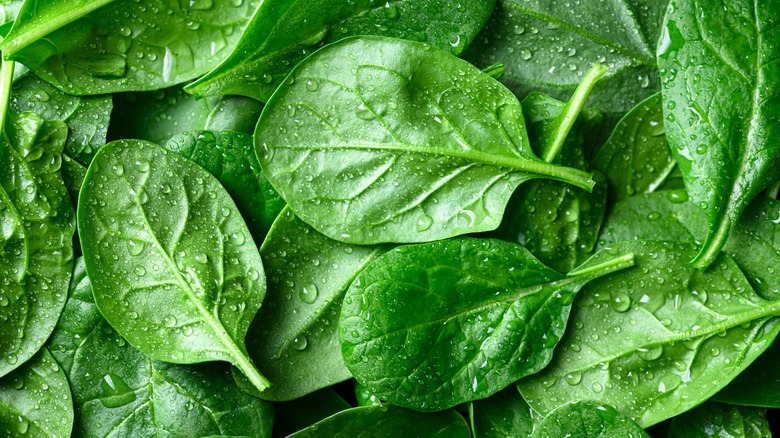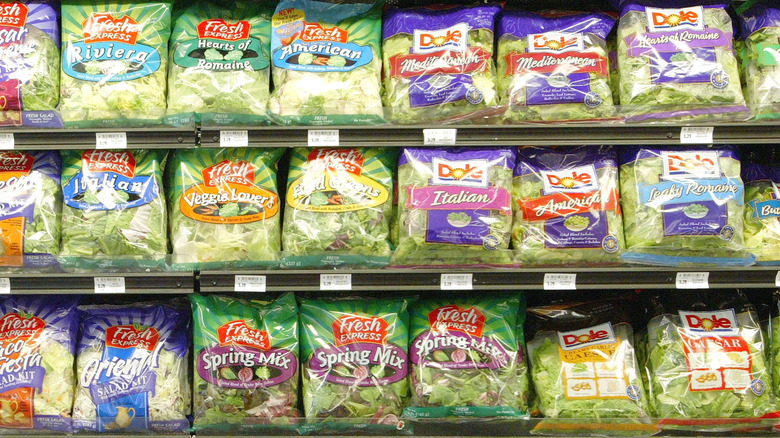The Biggest Recalls In Dole History
Recalls are par for the course in the food industry. Try though they may, it's impossible for brands to keep an omniscient eye on every step of the supply chain 24/7. While the risk of some issues (such as bacterial contamination) can be mitigated with the proper precautions, some slip through the cracks every now and then. That's especially true for businesses that deal with the likes of meat or fresh produce.
This is Dole's domain. Founded as Castle & Cooke in Hawaii in 1891, the company — which is now headquartered in Dublin, Ireland — made its name by shipping and selling fruits and veggies all over the globe. However, its story has been far from smooth. Back in the 2000s, the company faced financial struggles and nearly went bankrupt until billionaire David H. Murdock (who'd purchased Castle & Cooke in 1985 and spun Dole off as its own brand in 1996) took it private and helped it regain its footing in the fresh produce biz.
At the same time, Dole has juggled several food safety issues in its history. This has triggered multiple recalls, most of which have impacted Dole's veggie offerings. While some have been pretty minor, others have required that thousands of packets of lettuce, salads, or spinach be urgently pulled from grocery stores nationwide. Some have even posed health risks that are serious enough to lead to several hospitalizations, plus fatalities. These are the most serious recalls issued by Dole over the years.
Salad kits (2024)
One word that inevitably causes panic in the food industry is "listeria." In February 2024, this was the term that launched a mass recall from Dole after the discovery that some of its salad kits were potentially contaminated with listeria monocytogenes. This bacteria has the ability to cause nausea, abdominal pain, and diarrhea in healthy patients, and can sometimes be fatal to young children, the elderly, and the immunocompromised. It's also been linked to stillbirths and miscarriages when it infects pregnant people.
Alarm bells were raised after it was found that the salad kits (including Chopped Kit Avocado Ranch, Supreme Kit Southwest Salad, and Salad Kit Bacon Ranch Crunch) were processed alongside a line of cheese that was recalled by Rizo-Lopez Foods due to listeria contamination. "This recall notification is being issued due to the potential for cross-contamination of cheese contained in certain masterpacks by cheese potentially contaminated with Listeria monocytogenes from our packaged cheese supplier," Dole Vegetables said in a public statement.
The salads had already been distributed across 25 states, plus Alberta, British Columbia, New Brunswick, Ontario, and Quebec in Canada. Anyone who'd recently purchased a Dole salad was urged to check that no affected packages were lurking in their refrigerator or freezer and throw them away if they were discovered there. The products in question were marked with "best if used by" dates between February 3 and February 21. Fortunately, nobody reported any illnesses, but it's always better to err on the side of caution.
Iceberg lettuce (2022)
Leafy greens are especially prone to listeria because they typically grow close to the ground, where they can easily pick up bacteria from contaminated soil or animal manure. It also doesn't help that a lot of these greens are consumed raw, which would eliminate the possibility of high temperatures killing off the bacteria. That's why it's always a good idea that you wash your veggies before eating or cooking — and why Dole ended up having to issue a nationwide recall for every product containing its iceberg lettuce in January 2022.
After equipment that had been used to harvest said lettuce tested positive for listeria monocytogenes, Dole was forced to pull anything made with lettuce at its production plants in Springfield, Ohio and Soledad, California. This covered a multitude of products, including those sold under brand names such as Walmart's Marketside, Aldi's Little Salad Bar, Kroger, and President's Choice. It also expanded beyond the U.S., with multiple Canadian provinces (including Alberta, British Columbia, and Saskatchewan) affected by the recall as well.
Luckily, no illnesses were reported and no non-lettuce products were implicated in the recall. However, anyone who found one of the products (which came bearing a "best if used by" date between December 22, 2021 and January 9, 2022) in their homes was still encouraged to not eat them and instead ditch them ASAP.
180 varieties of salad (2021)
What made Dole's January 2022 lettuce recall all the more headline-worthy is the fact that it was the brand's second recall of its kind in less than a month. In December 2021, Dole had already been forced to recall a whopping 180 varieties of salad sold under the Dole name as well as Lidl, Kroger, Marketside, Naturally Better, Nature's Promise, and Simply Nature.
Again, this was all because of listeria. The brand announced that all Dole-branded and private label salads packaged at its plants in Bessemer City, North Carolina and Yuma, Arizona were at risk of contamination, with listeria monocytogenes having been identified in a garden salad and lettuce after random tests conducted by the states of Georgia and Michigan.
The bacteria in question was a genetic match for a strain that the Food and Drug Administration (FDA) and Centers for Disease Control and Prevention (CDC) claimed was responsible for at least 16 illnesses since 2014. Of these victims, 12 were hospitalized and two died in Michigan and Wisconsin. In addition to going through the usual motions of asking customers to check any salad they may have at home, Dole decided to close both facilities for full sanitization. However, some questioned why it took so long to take action if cases had been recorded for seven years.. As per food safety attorney Bill Marler, there was likely ongoing but low levels of bacteria in these facilities that weren't picked up in early investigations (via Marler Clark).
Blueberries (2021)
On June 24, 2021, it was Dole's fruit, not its veggies, that spurred a recall for once. Cases of fresh Dole blueberries were recalled due to fears that they were contaminated with the parasite cyclospora. Once consumed via food or drink, cyclospora can infect the intestinal tract and cause cyclosporiasis, the symptoms of which include watery diarrhea, vomiting, stomach pain, and nausea. These are typically treated with a round of antibiotics. However, like most foodborne illnesses, symptoms can be much more serious for those with weakened immune systems.
While no illnesses were reported in relation to the berries, Dole still got to work pulling 6-, 18-, and 24-ounce, and pint-size packages from stores in Illinois, Maine, New York, and Wisconsin, plus Alberta and British Columbia in Canada. Customers were told to check if their berries bore a "best if used by" date between May 28 and June 9, 2021 and discard any that featured certain lot codes listed on the FDA website.
It was unclear how exactly the parasite found its way into the blueberries, but it is typically spread when produce is sprayed with contaminated water or handled by those who are already infected. The recall also came in what was peak cyclospora season around summer.
Romaine lettuce (2020)
Back in November 2020, tracking down romaine lettuce could prove to be a real challenge. At that time, another company, Tanimura & Antle Inc., had launched its own recall of 3,396 cartons of packaged romaine lettuce at the beginning of the month. The lettuce — which was contaminated with the E. coli bacteria — was pulled from over 1,100 Walmart stores after 12 people fell ill and five were hospitalized.
Just weeks later, a packet of Dole organic romaine lettuce also tested positive for E. coli when the Michigan Department of Agriculture and Rural Development (which also identified the issues at Tanimura & Antle) collected a random sample in a grocery store. Despite the fact that this was never linked to any reported illnesses or complaints, Dole decided to pull two varieties of romaine lettuce that were harvested on two specific dates (October 23 and October 26, 2020). Company spokespeople also stressed that this was a different strain of E. coli than the one that had triggered Tanimura & Antle's recall.
This lettuce had already been distributed in many states. However, by the time the recall was issued, it was theoretically long out of circulation and wouldn't necessarily cause widespread illness. Yet, the FDA was concerned that some customers may still have had the lettuce at home. Anybody who did was instructed not to eat it and instead throw it away, stat.
Packaged salads (2016)
A significant listeria outbreak occurred in 2015 and 2016 that was ultimately traced back to Dole packaged salads. All affected salads were produced at Dole's facility in Springfield, Ohio, which subsequently shut its doors for four months. This decision, combined with the recall itself, cost Dole a reported $25.5 million.
While the CDC began investigating the outbreak in September 2015, it only linked it to Dole products in January 2016. The outbreak affected multiple products, including those sold under the Dole name and other private labels, across 23 states and three Canadian provinces. By the time the outbreak was declared over in March 2016, 12 people had been hospitalized and one Michigan resident died after contracting serious infections from listeria.
The outbreak didn't exactly work wonders for Dole's reputation. In the wake of the outbreak, the U.S. Justice Department launched a criminal investigation into the company. A government report covered by The Wall Street Journal claimed that Dole knew about potentially dangerous bacteria in its Ohio facility over a year before the recall, with federal investigators finding that it had failed to carry out the necessary tests to mitigate the risks of contamination. They claimed that Dole didn't test the surfaces that came into contact with food and that its testing was conducted in other spots around the plant, which would've reduced the risk of finding listeria. In 2017, Dole also settled two civil lawsuits in regard to the outbreak.
Spinach (2015)
The same processing plant in Springfield, Ohio had already generated controversy long before Dole started recalling its salads in 2016. The facility had already been at the heart of another outbreak in 2015, when routine safety testing by Michigan Department of Agriculture and Rural Development (which seems to be truly working overtime to protect us from foodborne illness) identified salmonella in a single package of Dole's bagged spinach.
While this recall wasn't as big as the one that followed soon after in 2016, it still affected about 33,600 bags of spinach with a use-by date of October 15, 2015. These were distributed across 13 states. Both consumers and stores were warned by Dole to ditch bags that met that description. "The FDA told us about the test yesterday, and we immediately began recalling the product," Dole spokesperson William Goldfield told USA TODAY. "I believe the FDA is going through the plant right now, and we expect to get back up and running soon."
Fortunately, unlike the packaged salad outbreak that would follow a year later, no illnesses were reported as a result of the contamination. This is all the more lucky when you consider the fact that salmonella — a bacteria that is most commonly associated with chicken, but can impact all kinds of food — can trigger serious symptoms. These include the likes of diarrhea, fever, stomach pain, nausea, and vomiting. Most cases are mild but, as per the CDC, it still kills an estimated 420 people in the U.S. every year.
Seven Lettuces salads (2012)
On April 14, 2012, a recall was issued by Dole after more random testing – this time courtesy of the State of New York – showed positive results for salmonella bacteria in bags of Dole's Seven Lettuces salad. The salad had already been distributed to stores across 15 states, sparking calls for customers to ditch 756 cases of lettuce.
All of the products that were covered by the recall featured a use-by date of April 11, 2012. This meant that, at least theoretically, most of the salad would have already been consumed or thrown out by the time the recall notice circulated. While no illnesses were reported and no other lettuces or salads were affected by the recall, any customers who'd purchased Dole's Seven Lettuces salad were encouraged to contact a healthcare provider if they contracted any of the typical symptoms of salmonella. These include upsets such as diarrhea or vomiting.
The recall also warned customers to double-check any lettuce they may have at home, with Dole also reaching out to retailers that stocked the leafy greens to make sure any and all affected products had been swiped from shelves before anyone fell ill.
Spinach (2006)
One of the biggest recalls to hit Dole came in the wake of a massive E. coli outbreak in 2006. Dole is the parent company of Natural Selection Foods, which produced the bagged spinach that the FDA later announced was the cause of the outbreak.
Over 200 people were infected over the course of the outbreak. At least 103 were hospitalized and 31 developed a type of kidney failure known as hemolytic–uremic syndrome. Three people died as a result of their infections. Having collected 13 bags of spinach from ill consumers, the FDA managed to establish that they were all processed on August 15, 2006. It also used the production codes to trace the spinach back to a ranch in San Benito, California. There, the strain of E. coli was identified in water and the feces of both cattle and wild pigs that were to be found in the area. The FDA also found evidence of wild pigs around the areas used to grow spinach but said it couldn't make a definitive call as to how exactly the spinach was contaminated.
While it may not have been able to pinpoint precisely when and how the spinach was contaminated, the investigation was still considered a massive success. "This is the first time we've found a clear link between an individual with a contaminated product and taken that link down to the farm level," Kevin Reilly, deputy director for prevention services at the California Department of Health Services, told CIDRAP in 2007.
Bagged lettuce (2005)
According to the FDA, E. coli is primarily spread when the feces of infected persons or animals – some of whom may be asymptomatic — come into contact with food or water. With that in mind, it really is at least a bit horrifying how often E. coli outbreaks force big brands to pull all manner of products from grocery store shelves.
In October 2005, E. coli made yet another appearance in Dole's recall history — this time, in bags of three varieties of lettuce (more specifically, the brand's Classic Romaine, American Blend, and Greener Selection), all of which bore a "best if used by" date of September 23, 2005. By the time the FDA had announced the recall, however, these products should theoretically have already long run their course in-store. Still the overarching fear for public health officials was, as always, that some people may have still had the lettuce at home without realizing.
The Minnesota Department of Health that first raised the alarm about illnesses linked to Dole lettuce purchased at the state's Rainbow Foods grocery store outlets. However, given that lettuce bearing the same production code was also distributed nationwide, the recall expanded. "Given the severity of this illness, FDA believes an urgent warning to consumers is needed," said Dr. Robert Brackett, then the FDA's Center for Food Safety and Applied Nutrition director (via NBC News). Ultimately, it infected a total of 32 people in Minnesota, Wisconsin, and Oregon, with multiple individuals also hospitalized.
